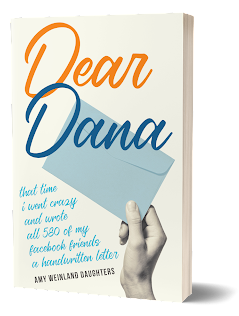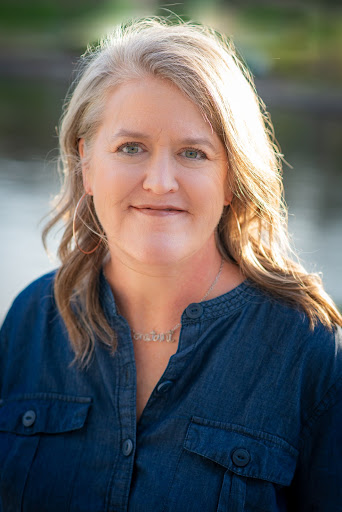 HOUSTON – When’s the last time you’ve received a handwritten letter in the mail? The validity of online connections is put to the test when author Amy Daughters just does that in “Dear Dana: That Time I Went Crazy and Wrote All 580 of my Facebook Friends a Handwritten Letter” (She Writes Press, May 17, 2022).
HOUSTON – When’s the last time you’ve received a handwritten letter in the mail? The validity of online connections is put to the test when author Amy Daughters just does that in “Dear Dana: That Time I Went Crazy and Wrote All 580 of my Facebook Friends a Handwritten Letter” (She Writes Press, May 17, 2022).
When Amy Daughters reconnected with her old pal Dana on Facebook, she had no idea how it would change her life. Though the two women hadn’t had any contact in 30 years, it didn’t take them long to catch up — and when Amy learned that Dana’s son Parker was doing a second stint at St. Jude battling cancer, she was suddenly inspired to begin writing the pair weekly letters. When Parker died, Amy — not knowing what else to do — continued to write Dana. Eventually, Dana wrote back, and the two became pen pals, sharing things through the mail that they had never shared before. The richness of the experience left Amy wondering something: If my life could be so changed by someone I considered “just a Facebook friend,” what would happen if I wrote all my Facebook friends a letter?
A whopping 580 handwritten letters later Amy’s life, and most of all her heart, would never, ever, be the same again. As it turned out, there were actual individuals living very real lives behind each social media profile, and she was beautifully connected to each of those extraordinary, flawed people for a specific reason. They loved her, and she loved them. And nothing — not politics, beliefs, or lifestyle — could separate them.
“Captivating . . . Whether written or spoken, our words matter. They have the power to illuminate someone’s darkest day.” — Laurie Buchanan, PhD, author of “Note to Self: A Seven-Step Path to Gratitude” and “Growth and The Business of Being: Soul Purpose In and Out of the Workplace”
“Dear Dana: That Time I Went Crazy and Wrote All 580
of my Facebook Friends a Handwritten Letter”
Amy Weinland Daughters | May 17, 2022 | She Writes Press | Memoir
Paperback | 9781647429003 | $16.95 | Ebook | 9781647424060 | $8.99
Praise for “Dear Dana” and Amy Daughters:
“This is a book for anyone who wonders about the differences between a Facebook friend and a Real-Life friend and who yearns to see a person’s real life behind their Facebook image. It is also about the power of prayer and the abundance of kindness in our world. But ultimately, it’s about connection and how we are all connected when we come from love.”
Rivvy Neshama, author of “Recipes for a Sacred Life: True Stories and a Few Miracles”
“Amy shows us how something as simple as a letter — let alone 580 of them! — can change a life. Who else would decide to write a personal letter to every one of their Facebook friends? The stories from these letters provide insights into how we can help people through difficult times and connect with others—and, of course, plenty of good laughs.”
Brad Aronson, bestselling author of “HumanKind: Changing the World One Small Act At a Time”
“An intriguing and inspiring exploration of different forms of communication.”
Kirkus Reviews
“Dear Dana is an inspirational memoir about caring for friends near and far by reviving a lost art.”
Foreword Reviews
 AMY DAUGHTERS has spent the past 10 years freelancing on topics from college football to emotions. She is the author of “You Cannot Mess This Up: A True Story That Never Happened” (2019), for which she received recognition at the 2019 Foreword INDIES and the 2020 Next Generation Indie Awards. When she’s not writing, Daughters can be found researching history, golfing, or ribbon dancing. She lives in Tomball, Texas with her husband Willie and two sons, Will and Matthew.
AMY DAUGHTERS has spent the past 10 years freelancing on topics from college football to emotions. She is the author of “You Cannot Mess This Up: A True Story That Never Happened” (2019), for which she received recognition at the 2019 Foreword INDIES and the 2020 Next Generation Indie Awards. When she’s not writing, Daughters can be found researching history, golfing, or ribbon dancing. She lives in Tomball, Texas with her husband Willie and two sons, Will and Matthew.
Follow Amy Daughters on social media:
Facebook: AmyWeinlandDaughters | Twitter: @DaughtersAmy | Instagram: @smokinhotamys
In an interview, Amy Daughters can discuss:
- How her Facebook friends reacted to receiving letters from her
- In what ways this story is so important in this day and age
- How Amy’s faith drives her and her decisions
- The statistics associated with the Facebook project
- How much Amy learned about her Facebook friends through the process of writing the letters, and therefore how many assumptions she had that were incorrect
- How feeling guilty was an unexpected result of writing all the Facebook letters
- The power of non-instantaneous communication
- How we don’t need a reply to validate that we’ve made a difference
An interview with Amy Daughters
1. How did you know these events warranted a book? Was it something you figured out while it was happening or not until reflecting back on them?
I was about halfway through writing all my Facebook friends a letter when I first began considering a book. While I had some level of awareness that what I was experiencing was extraordinary throughout the process of writing the letters, I didn’t understand how passionate I would become about sharing the story until after the project was complete. Finishing was such a pivotal moment for me that the day after writing the final Facebook letter I wrote the first several chapters of what would ultimately become Dear Dana.
2. I cannot remember the last time I got a letter in the mail. What was the general reaction from your friends upon receiving theirs?
The recipients of the letters I heard back from were generally very surprised and delighted. This reaction was intensified when I didn’t have to ask for an address and the letter just magically showed up in a mailbox somewhere. This was especially true early in the project when word hadn’t gotten out that I was writing everyone a letter.
What also struck me was how many recipients expressed a deep emotional, and very personal, reaction to their letter. This even though I was crystal clear, in each and every letter, that I was writing every single one of my hundreds of Facebook friends. Somehow, they still felt specifically “chosen” to receive a letter.
Even now, several years later, recipients tell me how they keep their letter in a special place. How they reread it often because of how it still makes them feel. The overall reaction must have something to do with being treated as an individual in the age of social media, where we have become better informed but more depersonalized.
3. How has this story helped Dana and her family grieve the loss of Parker?
I have learned from my close association with Dana and her family that there is not much, if anything at all, that can legitimately help individuals who are suffering through a devastating loss.
I believe that my letters to Dana, and then the story of the Facebook letters and their direct connection back to Parker and the Rivera family, were and are a distraction to their stark reality.
It is my great hope that ultimately Dear Dana, which is understandably beyond difficult for the Rivera family to read, will become a far-reaching source of good that honors the memory of their precious Parker.
4. How has your faith driven your choices relating to writing the book?
I firmly believe that God orchestrated the entire sequence of events that are chronicled in Dear Dana: from Dana and I’s first meeting at camp in 1986, to the 30 years we spent apart, to our reconnection on Facebook, to the inspiration to begin writing her and Parker, through every single prayer, to the idea to write all my Facebook friends a letter, to the other-worldly determination and drive I had to finish the project, to the process of writing and publishing the book and all the way to Dana and I’s current bond as almost sisters and to the close link between our families.
That said, the process of writing 580 letters to 580 friends with different backgrounds, belief systems, stories and lifestyles, and hearing back from so many of them, and so much love being exchanged in all directions – led to me being completely committed to Dear Dana being a story that could resonate, touch, and inspire anyone, regardless of what they do or don’t believe.
5. How do you feel about Facebook and social media now? Do you still consider it a valid source to keep up with friends and family?
I absolutely feel that Facebook has value in keeping us connected. That said, social media is just a tool that can be used to enhance a relationship as opposed to sustaining it.
Facebook and social media lack realness because they do not require us to personally invest, to sacrifice or to risk something of value – all key elements that make human relationships concurrently wonderful and fraught. It’s not that we don’t care about or love our friends online, it’s that the very nature of social media makes it impossible to be in an authentic relationship.
6. Why is this an important story to read in this day and age?
Our current culture of divisiveness, hostility and distrust has cost each of us profoundly. Dear Dana reminds us that despite the reality of where we are as a society, hope not only exists in the periphery, but that it literally oozes all over the place. It is alive and well between you and the person sitting next to you – your coworker, your BFF, your neighbor, a stranger you’ve never even met and yes…your Facebook friend.
Combined, these individual relationships, fueled by love, can absolutely destroy every single barrier that separates us. As is the narrative of Dear Dana, amid devastation there is hope. We, simply by being connected, are one another’s hope.

A former award-winning journalist with national exposure, Marissa now oversees the day-to-day operation of the Books Forward author branding and book marketing firm, along with our indie publishing support sister company Books Fluent.
Born and bred in Louisiana, currently living in New Orleans, she has lived and developed a strong base for our company and authors in Chicago and Nashville. Her journalism work has appeared in USA Today, National Geographic and other major publications. She is now interviewed by media on best practices for book marketing.
